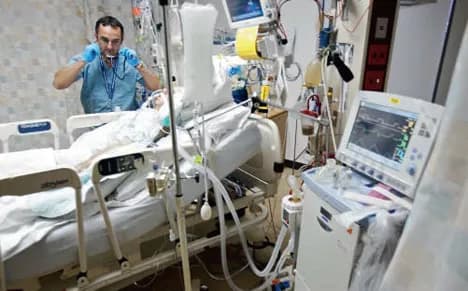
Global Economic Downturn Linked With At Least 260,000 Excess Cancer Deaths
The economic crisis of 2008-10, and the rise in unemployment that accompanied it, was associated with more than 260,000 excess cancer-related deaths--including many considered treatable--within the Organization for Economic Development (OECD), according to a study from Harvard T.H. Chan School of Public Health, Imperial College London, and Oxford University. The researchers found that excess cancer burden was mitigated in countries that had universal health coverage (UHC) and in those that increased public spending on health care during the study period.
The study will be published May 25, 2016 in The Lancet.
"Higher unemployment due to economic crisis and austerity measures is associated with higher number of cancer deaths. Universal health coverage protects against these deaths. That there are needless deaths is a major societal concern," said Rifat Atun, professor of global health systems at Harvard Chan School and senior author of the study. He added that increased joblessness during the economic crisis may have limited people's access to health care, leading to late-stage diagnoses and poor or delayed treatment.
"Cancer is a leading cause of death worldwide so understanding how economic changes affect cancer survival is crucial," says lead author Mahiben Maruthappu from Imperial College London, UK. "We also found that public healthcare spending was tightly associated with cancer mortality--suggesting healthcare cuts could cost lives."
Although previous studies have shown connections between economic changes and rates of suicides, cardiovascular disease, and overall mortality, only a few had examined the relationship between economic downturns and cancer outcomes, especially in countries with underdeveloped social security and health care systems.
The researchers analyzed the link between unemployment, public health care spending, and cancer mortality using data from 1990-2010 from more than 70 high- and middle-income countries around the world, representing roughly 2 billion people. The researchers looked at deaths from several "treatable" cancers, for which survival rates exceed 50%--including breast cancer in women, prostate cancer in men, and colorectal cancers in both men and women--and from a few "untreatable" cancers (with five-year survival rates less than 5%), including lung and pancreatic cancers in men and women.
The researchers found that increases in unemployment were associated with increased mortality from all the cancer types included in the study. The association was strongest for treatable cancers, suggesting that lack of access to care may have been a factor in these excess deaths. Also, comparing estimates of expected cancer deaths with actual deaths from 2008-10, they found that the recent global economic crisis was linked with more than 260,000 excess cancer deaths among the 35 member states of the OECD alone.
Adverse health effects persisted for several years after initial increases in unemployment, the study found. In addition, excess cancer deaths were a more significant problem in middle-income countries than in high-income countries.
In countries with UHC--defined in the study as countries that have legislation mandating UHC, more than 90% health care coverage, and more than 90% skilled birth attendance--the link between unemployment and excess cancer deaths disappeared, suggesting that greater access to health care played a key role in mitigating the problem. Twenty-six OECD countries were listed in the study as having UHC, while nine--Barbados, Latvia, Lithuania, Malta, Mexico, Poland, Russia, the U.S., and Uruguay--did not have it.
Researchers also found that increases in public sector health spending helped blunt the negative health impact of unemployment increases.
One limitation of the study was that it was not a truly global analysis, given scarcity of data from China, India, and low-income countries. The study was also unable to draw any firm conclusions about causality, although the authors did note that changes in unemployment were followed by changes in cancer mortality, which does suggest a causal link.
The above post is reprinted from materials provided by Harvard T.H. Chan School of Public Health. Note: Materials may be edited for content and length.
Disclaimer: DoveMed is not responsible for the adapted accuracy of news releases posted to DoveMed by contributing universities and institutions.
Primary Resource:
Maruthappu, M., Watkins, J., Noor, A. M., Williams, C., Ali, R., Sullivan, R., ... & Atun, R. (2016). Economic downturns, universal health coverage, and cancer mortality in high-income and middle-income countries, 1990–2010: a longitudinal analysis. The Lancet.
Related Articles
Test Your Knowledge
Asked by users
Related Centers
Related Specialties
Related Physicians
Related Procedures
Related Resources
Join DoveHubs
and connect with fellow professionals

0 Comments
Please log in to post a comment.